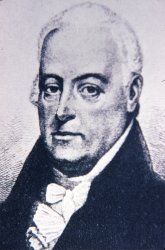These were the few irreconcilables
who held out to the last for a mere strengthening of the Articles of
Confederation and never agreed to the Constitution, even after the Great
Compromise was reached. There were only
three of these; Robert Yates and John Lansing of New York and Luther Martin of
Maryland.[1] Why were these three so irreconcilable? Maryland and New York were both on the large
end of the medium sized states, and both had major ports, which meant they
stood to lose a source of revenue under a more centralized system. Upstate New York, in particular, was able to
keep land taxes low by taxing foreign trade from Connecticut and New Jersey
that went through New York City and was reluctant to give up the
privilege. Maryland, on the other hand,
had no claims to western land and wanted Virginia and other states with such
claims to give them up. During the
ratification debates, there was little controversy in Maryland, and its convention
ratified the Constitution 63-11. (Martin strongly opposed it). In New
York, on the other hand, the Constitution was hotly controversial, and the
state convention ended up ratifying only when it became clear that ten other
states had ratified already and that New York was in danger of being left out
of the United States altogether. Indeed, the Federalist Papers were written in an attempt to sway New Yorkers in favor of the Constitution when it was a hotly contested issue.
Of these three, little needs to be
said about Robert Yates. He does not
appear to have participated in debate at all, but he voted together with Lansing
and against Hamilton (also of New York), and he walked out of the Convention at
the same time as Lansing.
John Lansing (New York): New York’s delegation participated in the
Convention up through July 10, 1787 and was absent the next day, never to return. Hamilton had already left after June 29,
despairing of building strong enough government. Lansing and Yates together consistently voted
for state sovereignty and against the Virginia Plan. By July 10, 1787, it was apparent that the
Virginia Plan would be adopted and that representation would be by population
in the lower house. The debate by then
was solely over equality in the Senate.
It was at this point that Lansing and Yates walked out, convinced that
their influence was at an end. They
never came back. Hamilton returned
August 13 and took part in the debates, but New York remained without a vote
because a single delegate was not allowed to represent an entire state. Hamilton was the only representative from New
York to sign the Constitution.
John Lansing probably played a role
in drafting the New Jersey Plan and, not too surprisingly, he supported it when
it was introduced. The Virginia Plan, he argued destroys the sovereignty of the states and absorbs all power except for
“little local matters,” whereas the New Jersey Plan preserves state sovereignty
and laws. He also argued that the
Convention did not have authority to propose an entire new system of
government, and the people and states would never agree to it, especially to
giving the general government a veto over all state laws. Even after the Virginia Plan
was adopted, Lansing made a last-ditch motion to vest all powers in “Congress,”
i.e., the old Continental Congress, making much the same arguments as before. He particularly objected to the federal veto
of state laws, saying that it would burden Congress with an unbearable amount
of work and involve people in the veto who had no knowledge of conditions in
the states whose laws the were vetoing. Not too surprisingly, he wanted to keep equal
representation by states, since states would never voluntarily part with their sovereignty and saw little use in even sending the issue of representation to committee (the committee that proposed
the Great Compromise).
Not long afterward, he returned to New York, and his participation was
at an end.
[1] John
Francis Mercer of Maryland might also fit into this category. He was a member of the Convention who opposed
the Constitution during ratification debates and favored state sovereignty, but
he arrived late and left early and therefore did not have much chance to make
his opinion known on the subject.

No comments:
Post a Comment